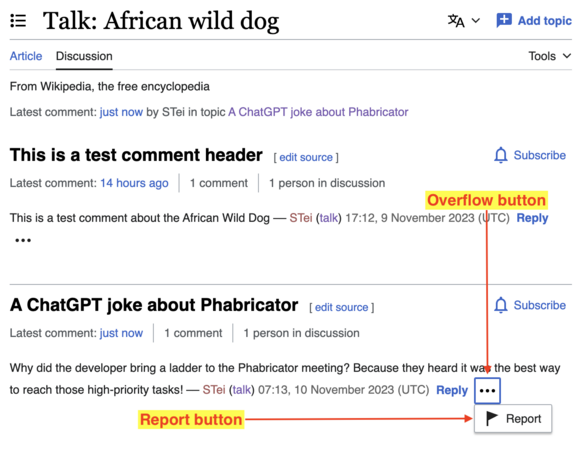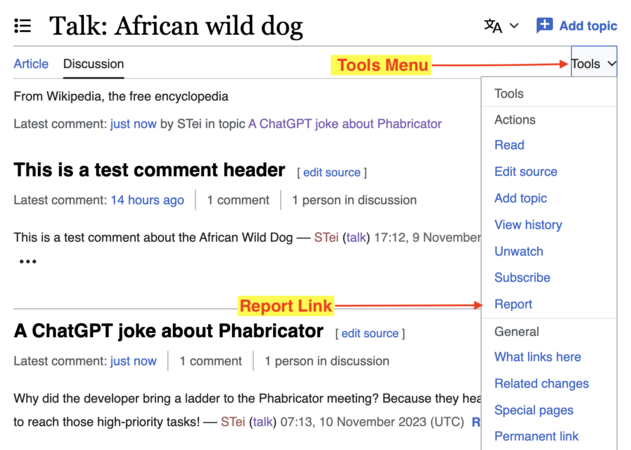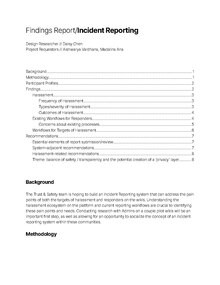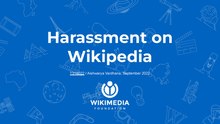Magánjellegű eseményeket jelentő rendszer
We have renamed the Private Incident Reporting System as Incident Reporting System. The word "Private" has been removed. In the context of harassment and the UCoC the word “Private” refers to respecting community members’ privacy and ensuring their safety. It does not mean that all phases of reporting will be confidential. We have received feedback that this term is therefore confusing and can be difficult to translate in other languages, hence, the change. |
Leírás
A Wikimédia Alapítvány javítani szeretné, hogy a zaklatást és a visszaélések más formáit tapasztaló emberek hogyan jelentik az ilyen káros eseteket, hogy biztonságosabb és egészségesebb környezet legyen a közösségek számára.
Az újonnan létrehozott Bizalom és biztonsági eszközök csapat feladata a Magánjellegű eseményeket jelentő rendszer (PIRS) kiépítése. Célunk, hogy a felhasználók számára megkönnyítsük a veszélyes incidensek biztonságos és privát bejelentését.
A projekt háttere
Reporting and processing of harmful incidents has been a topic of interest for Wikimedia communities for many years. With the new Universal Code of Conduct being set up, it is crucial to also have a discussion about user reporting systems.
A Wikimédia különböző területein és projektjeiben az incidensek, a helytelen viselkedés és az irányelvek megsértésének kezelése szervesen alakult ki, és közösségről közösségre változik.
Minden Wikimédia-projekt vagy közösség a maga módján kezeli a dolgokat. Az incidensek jelentése és feldolgozása különböző módon történik:
- a wiki vitalapjai segítségével
- üzenőfalakon keresztül
- e-mailben
- privát beszélgetéseken keresztül a wikin kívüli kommunikációs csatornákon (Discord, IRC)
Számos felhasználó számára nem egyértelmű, hogy mi a teendő, ha incidens történik: hova kell menni, kivel kell beszélni, hogyan kell jelenteni, milyen információkat kell a jelentésbe foglalni, hogyan dolgozzák fel a jelentést, mi történik utána stb.
A felhasználóknak tudniuk kell, hogyan és hol jelenthetnek be egy problémát. Arról is nagyon kevés információ áll rendelkezésre, hogy mi történik a bejelentés után, és milyen elvárásokat kell teljesítenie a felhasználónak.
A felhasználók egy része nem érzi magát biztonságban, ha incidenseket jelent, mert a bejelentési folyamat bonyolult, és mert aggódnak a magánélet védelmével kapcsolatban.
Jelenleg nincs szabványosított módja annak, hogy a felhasználók magánjellegű jelentéseket nyújtsanak be.
A projekt fókusza
A projekt magas szintű célja tehát az, hogy megkönnyítse a zaklatás és a veszélyes incidensek kezelését.
Garantálni szeretnénk a bejelentők magánéletét és biztonságát, valamint gondoskodni arról, hogy a bejelentés eljusson a megfelelő, feldolgozásra hivatott szervhez, miközben nem ró extra nyomást azokra, akik a feldolgozást végzik.
A Bizalom és Biztonsági Eszközök Csapat is vizsgálja ezt az incidensjelentő rendszert egy nagyobb incidenskezelési rendszer részeként, többek között a megelőző munka, a nézeteltérések kezelése, mielőtt azok elfajulnának, az incidensek feldolgozása, az esetek összekapcsolása és nyomon követése stb. céljából.
Product and Technical Updates
Test the Incident Reporting System Minimum Testable Product in Beta – November 10, 2023
Editors are invited to test an initial Minimum Testable Product (MTP) for the Incident Reporting System.
The Trust & Safety Product team has created a basic product version enabling a user to file a report from the talk page where an incident occurs.
Note: This product version is for learning about filing reports to a private email address (e.g., emergency![]() wikimedia.org or an Admin group). This doesn't cover all scenarios, like reporting to a public noticeboard.
wikimedia.org or an Admin group). This doesn't cover all scenarios, like reporting to a public noticeboard.
Your feedback is needed to determine if this starting approach is effective.
To test:
1. Visit any talk namespace page on Wikipedia in Beta that contains discussions. We have sample talk pages available at User talk:Testing and Talk:African Wild Dog you can use and log in.
2. Next, click on the overflow button (vertical ellipsis) near the Reply link of any comment to open the overflow menu and click Report (see slide 1). You can also use the Report link in the Tools menu (see slide 2).
-
 Slide 1
Slide 1 -
 Slide 2
Slide 2
3. Proceed to file a report, fill the form and submit. An email will be sent to the Trust and Safety Product team, who will be the only ones to see your report. Please note this is a test and so do not use it to report real incidents.
4. As you test, ponder these questions:
- What do you think about this reporting process? Especially what you like/don’t like about it?
- If you are familiar with extensions, how would you feel about having this on your wiki as an extension?
- Which issues have we missed at this initial reporting stage?
5. Following your test, please leave your feedback on the talk page.
Troubleshooting If you can't find the overflow menu or Report links, or the form fails to submit, please ensure that:
If DiscussionTools doesn’t load, a report can be filed from the Tools menu. If you can't file a second report, please note that there is a limit of 1 report per day for non-confirmed users and 5 reports per day for autoconfirmed users. These requirements before testing help to reduce the possibility of malicious users abusing the system. |
Update: Sharing incident reporting research findings – September 20, 2023
The Incident Reporting System project has completed research about harassment on selected pilot wikis.
The research, which started in early 2023, studied the Indonesian and Korean Wikipedias to understand harassment, how harassment is reported and how responders to reports go about their work.
The findings of the studies have been published.
Please see the research section of the page for more.
Four Updates on the Incident Reporting Project – July 27, 2023
Hello everyone! For the past couple of months the Trust and Safety Product team has been working on finalising Phase 1 of the Incident Reporting System project.
The purpose of this phase was to define possible product direction and scope of the project with your feedback. We now have a better understanding of what to do next. Read more.
Project Scope & MVP – November 8, 2022
Our main goal for the past couple of months was to understand the problem space and user expectations around this project. The way we would like to approach this is to build something small, a minimum viable product (MVP), that will help us figure out whether the basic experience we are looking at actually works. Read more.
Folyamat
As this is a complex project it needs to be split into multiple iterations and project phases. For each of these phases we will hold one or several cycles of discussions in order to ensure that we are on the right track and that we incorporate community feedback early, before jumping into large chunks of work.
1. szakasz
Preliminary research: collect feedback, reading through existing documentation.
Conduct interviews in order to better understand the problem space and identify critical questions we need to answer.
Define and discuss possible product direction and scope of project. Identify possible pilot wikis.
At the end of this phase we should have a solid understanding of what we are trying to do.
2. szakasz
Create prototypes to illustrate the ideas that came up in Phase 1.
Create a list of possible options for more in-depth consultation and review.
3. fázis
Identify and prioritize the best possible ideas.
Transition to software development and break down work in Phabricator tickets.
Continue cycle for next iterations
Kutatás
15 July 2024 Update: Sharing Incident Reporting System Minimum Viable Product (MVP) User Testing Summary
In March 2024, the Trust & Safety Product team conducted user testing of the Minimum Viable Product (MVP) of the Incident Reporting System to learn if users know where to go to report an emergency incident, and if the user flow makes sense and feels intuitive.
We learned the following:
- During user testing, all participants found the entry point to report an incident and the current user flow is well understood.
- There was some confusion over two of the reporting options: “someone might cause self-harm” and “public harm threatening message”.
Two participants also made assumptions about the system being automated. One participant was concerned about automation and wanted a human response, whereas the other participant felt assured by the idea it would check if the abuser had any past history of threats and offences, and delete the offensive comment accordingly. All participants expected a timely response (an average of 2-3 days) after submitting a report. Read more.
21 September 2023 Update: Sharing incident reporting research findings

The Incident Reporting System project has completed research about harassment on selected pilot wikis.
The research, which started in early 2023, studied the Indonesian and Korean Wikipedias to understand harassment, how harassment is reported and how responders to reports go about their work.
The findings of the studies have been published.
In summary, we received valuable insights on the improvements needed for both onwiki and offwiki incident reporting. We also learned more about the communities' needs, which can be used as valuable input for the Incident Reporting tool.
We are keen to share these findings with you; the report has more comprehensive information.
Please leave any feedback and questions on the talkpage.
The following document is a completed review of research from 2015–2022 the Wikimedia Foundation has done on online harassment on Wikimedia projects. In this review we’ve identified major themes, insights, and areas of concern and provided direct links to the literature.

Previous work
A Bizalom és biztonsági eszközök csapata a korábbi kutatásokat és közösségi egyeztetéseket tanulmányozta, hogy tájékozódhasson munkánkról. Újra átnéztük a Közösségi egészségvédelmi kezdeményezés felhasználói jelentési rendszerre vonatkozó javaslatát és A 2019-es felhasználói jelentési rendszerrel kapcsolatos konzultációt. Megpróbáltunk feltérképezni néhány konfliktusmegoldási folyamatot is a wikiken belül, hogy megértsük, hogyan kezelik jelenleg a közösségek a konfliktusokat. Az alábbiakban az olasz wiki konfliktusmegoldási folyamatának térképét mutatjuk be. Megjegyzéseket tartalmaz az automatizálási lehetőségekre vonatkozóan.

Frequently Asked Questions
Q: Is there data available about how many incidents are reported per year?
A: Right now there is not a lot of clear data we can use. There are a couple of reasons for this. First, issues are reported in various ways and those differ from community to community. Capturing that data completely and cleanly is highly complicated and would be very time consuming. Second, the interpretation of issues also differs. Some things that are interpreted as harassment are just wiki business (e.g. deleting a promotional article). Review of harassment may also need cultural or community context. We cannot automate and visualize data or count it objectively. The incident reporting system is an opportunity to solve some of these data needs.
Q: How is harassment being defined?
A: Please see the definitions in the Universal Code of Conduct.
Q: How many staff and volunteers will be needed to support the IRS?
A: Currently the magnitude of the problem is not known. So the amount of people needed to support this is not known. Experimenting with the minimum viable product will provide some insight into the number of people needed to support the IRS.
Q: What is the purpose of the MVP (minimal viable product)?
A: The MVP is an experiment and opportunity to learn. This first experimental work will answer the questions that we have right now. Then results will guide the future plans.
Q: What questions are you trying to answer with the minimum viable product?
A: Here are the questions we need to answer:
- What kind of reports will people file?
- How many people will file reports?
- How many people would we need in order to process them?
- How big is this problem?
- Can we get a clearer picture of the magnitude of harassment issues? Can we get some data around the number of reports? Is harassment underreported or overreported?
- Are people currently not reporting harassment because it doesn’t happen or because they don’t know how?
- Will this be a lot to handle with our current setup, or not?
- How many are valid complaints compared to people who don't understand the wiki process? Can we distinguish/filter valid complaints, and filter invalid reports to save volunteer or staff time?
- Will we receive lots of reports filed by people who are upset that their edits were reverted or their page was deleted? What will we do with them?
Q: How does the Wikimedia movement compare to how other big platforms like Facebook/Reddit handle harassment?
A: While we do not have any identical online affinity groups, the Wikimedia movement is most often connected with Facebook and Reddit in regard to how we handle harassment. What is important to consider is nobody has resolved harassment. Other platforms struggle with content moderation, and often they have paid staff who try to deal with it. Two huge differences between us and Reddit and Facebook are the globally collaborative nature of our projects and how communities work to resolve harassment at the community-level.
Q: Is WMF trying to change existing community processes?
A: Our plan for the IRS is not to change any community process. The goal is to connect to existing processes. The ultimate goals are to:
- Make it easier for people who experience harassment to get help.
- Eliminate situations in which people do not report because they don’t know how to report harassment.
- Ensure harassment reports reach the right entities that handle them per local community processes.
- Ensure responders receive good reports and redirect unfounded complaints and issues to be handled elsewhere.


